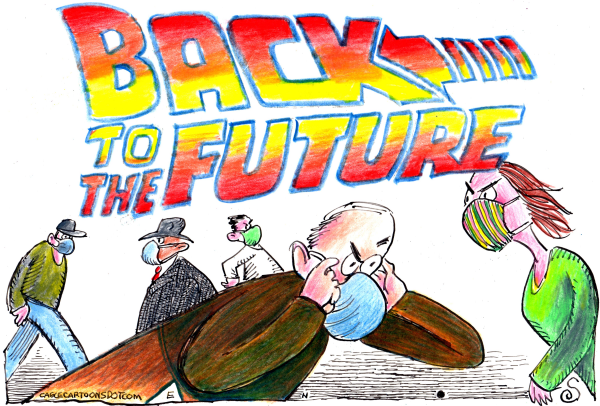 The Washington Post leads its story on this week's startling new climate assessment by the U.N.'s Intergovernmental Panel on Climate Change (IPCC) by calling back to the earliest, prescient warnings issued by the panel more than 30 years ago "that humans were fueling a dangerous greenhouse effect and that if the world did not act collectively and deliberately to slow Earth’s warming, there could be 'profound consequences' for civilization itself. "The scientists were right," they declare, citing evidence from the latest alarming iteration of the IPCC's dire report released this week. But, as our guest, one of the scientists who contributed to the panel's 2001 Nobel Prize-winning assessment, explains on today's BradCast, there is still time to act to avoid the worst consequences of having ignored the early alarm bells. But we are very much now on a "knife's edge". [Audio link to full show is posted below this summary.]
The Washington Post leads its story on this week's startling new climate assessment by the U.N.'s Intergovernmental Panel on Climate Change (IPCC) by calling back to the earliest, prescient warnings issued by the panel more than 30 years ago "that humans were fueling a dangerous greenhouse effect and that if the world did not act collectively and deliberately to slow Earth’s warming, there could be 'profound consequences' for civilization itself. "The scientists were right," they declare, citing evidence from the latest alarming iteration of the IPCC's dire report released this week. But, as our guest, one of the scientists who contributed to the panel's 2001 Nobel Prize-winning assessment, explains on today's BradCast, there is still time to act to avoid the worst consequences of having ignored the early alarm bells. But we are very much now on a "knife's edge". [Audio link to full show is posted below this summary.]
First up today, however, some very quick news: On Texas Republicans issuing arrest warrants for Democratic state lawmakers who are fighting to prevent the GOP legislature from instituting new voter suppression measures; On the CDC urging vaccination of pregnant women amid a surge in COVID hospitalizations, miscarriages and deaths of expectant mothers; On California mandating either vaccination or regular testing for all teachers and school staff as the new school year begins; And on the overnight passage in Congress of a framework for the Democrats' landmark $3.5 trillion budget reconciliation bill that is to designed to expand health care, child care, education and much more, including long overdue measures to finally take on our worsening climate emergency by reducing reliance on the fossil fuels that are quickly hastening the deadly effects of global warming.
Amid a summer marked by seemingly endless and catastrophic heat waves, wildfires, floods and droughts across the globe, the 6th IPCC Climate Assessment comes not a moment too soon. Described by the U.N. Secretary-General this week as a "code red for humanity", the latest report, coming 8 years after the previous one, now cites "unprecedented" warming that has already occurred, and unstoppable catastrophes to come if the nations of the world are unable to immediately begin to sharply decrease the dangerous burning of fossil fuels.
We're joined today by DR. MICHAEL E. MANN, Distinguished Professor and Director of the Earth System Science Center at Pennsylvania State University. He is also the author of more than 160 peer-reviewed publications and numerous books on climate change and the battles to avoid its most cataclysmic effects. He is also one of the few climate scientists who spoke up early and loudly about the desperate need for action by our political leaders. Happily, as we also discuss today, there are now many more such scientists who have joined in that existential effort.
"What's different about this latest report is that now the scientists really are standing on the rooftop of the tallest building, shouting at the top of their lungs that dangerous climate change is here," Mann tells us. He says the new IPCC assessment "finally connects the dots in a way that previous reports haven't. And it does so in a profound way, because we are literally watching the disastrous impacts of climate change playing out right now in real time."
Mann breaks down what the new, non-partisan study, compiled by nearly 250 of the world's leading climatologists, synthesizing some 14,000 peer-reviewed studies from over the past 8 years, means for the public in general, policy makers specifically, as well as the fossil fuel industry and even his fellow scientists.
Policy makers "have to act now," he charges. "Not ten years from now. Not twenty years from now. We need to decarbonize the planet, our global economy, as quickly as possible." Mann also notes the "fortuitous timing" of the $3.5 trillion budget bill from President Biden and the Democrats now moving through Congress, which, he says, "really does have meaningful climate policy" to narrow "the implementation gap" between what politicians are saying and the "policies that actually get us there."
As to the science revealed by the U.N.'s new assessment, Mann details our various potential paths outlined by the report, predicated on the choices that world leaders now make, and whether any of those paths can prevent us from exceeding the maximum 2 degrees Celsius warming over pre-industrial times that scientists have long warned would result in irreversible damage to nature, society, and humanity itself.
"The report, I think, defensibly concludes that we can still prevent the worst impacts from playing out, if we can hold temperatures below 1.5C. I think the weight of evidence suggests that we can still keep all of this within what you might call our 'adaptive capacity' as a civilization. Once we go beyond 2C, you're starting to test the limits of that adaptive capacity. Once you get to 3C, 4C, or 5C, it's appropriate to start talking about civilization-ending climate change," Mann explains, before adding: "But we can avoid that. That's a critical point. That does not have to be our future. That's a future of inaction."
That, as the report notes global temperatures have already spiked by about 1.1 Celsius (almost 2 degrees Fahrenheit) on average since the 19th century, a trend which will almost certainly require decades to reverse, even under the best-case scenarios.
There is, of course, much more to our conversation, including what Mann derides as "doomism" among those inclined to take action to meet necessary goals such as reaching net-zero emissions by mid-century, if not earlier, but who may have decided that it's just too late, that only a miracle can save us now. He compares "doomism" to the worst of "denialism" by the fossil fuel-funded nihilist fighting AGAINST taking action. He also takes another shot at billionaire Bill Gates, whose book on climate Mann and I discussed on his previous appearance on the program earlier this year.
"To reduce carbon emissions, as the report says we need to, as energy experts say we can, we don't need a miracle , Bill Gates. Sorry. But we have the technology now to do this. What we need is the political willpower. If we do that, we really can keep the warming to a level we can adapt to."
Whether he's right remains to be seen. So far, however, the scientists have been right about pretty much everything else on this front. The only real question is if we're finally willing to listen to them and take the immediate action they have long been urging us to take...
(Snail mail support to "Brad Friedman, 7095 Hollywood Blvd., #594 Los Angeles, CA 90028" always welcome too!)
|


 'Bullet Ballot' Claims, Other Arguments for Hand-Counting 2024 Battleground Votes: 'BradCast' 11/19/24
'Bullet Ballot' Claims, Other Arguments for Hand-Counting 2024 Battleground Votes: 'BradCast' 11/19/24 'Green News Report' 11/19/24
'Green News Report' 11/19/24
 Trump Already Violating Law (He Signed!) During Transition: 'BradCast' 11/18/24
Trump Already Violating Law (He Signed!) During Transition: 'BradCast' 11/18/24 Sunday 'Into the Gaetz of Hell' Toons
Sunday 'Into the Gaetz of Hell' Toons Computer Security Experts Ask Harris to Seek Hand-Counts Due to Voting System Breaches: 'BradCast' 11/14/24
Computer Security Experts Ask Harris to Seek Hand-Counts Due to Voting System Breaches: 'BradCast' 11/14/24  'Green News Report' 11/14/24
'Green News Report' 11/14/24 Trump Criminal Cases Fade After Election as GOP 'Does Not Believe in Rule of Law': 'BradCast' 11/13/24
Trump Criminal Cases Fade After Election as GOP 'Does Not Believe in Rule of Law': 'BradCast' 11/13/24 Climate Advocates Brace for Fight With Trump 2.0: 'BradCast' 11/12/24
Climate Advocates Brace for Fight With Trump 2.0: 'BradCast' 11/12/24 'Green News Report' 11/12/24
'Green News Report' 11/12/24 Let It All Out: 'BradCast' 11/11/24
Let It All Out: 'BradCast' 11/11/24 Sunday 'Like it or Not' Toons
Sunday 'Like it or Not' Toons Not All Bad: Abortion Rights Won Big (Almost) Everywhere: 'BradCast' 11/7/24
Not All Bad: Abortion Rights Won Big (Almost) Everywhere: 'BradCast' 11/7/24 'Green News Report' 11/7/24
'Green News Report' 11/7/24 U.S. CHOOSES CONVICTED CRIMINAL, ADJUDICATED RAPIST: 'BradCast' 11/6/24
U.S. CHOOSES CONVICTED CRIMINAL, ADJUDICATED RAPIST: 'BradCast' 11/6/24 ELECTION DAY 2024: Tea Leaves, Probs for Voters, What's Next: 'BradCast' 11/5/24
ELECTION DAY 2024: Tea Leaves, Probs for Voters, What's Next: 'BradCast' 11/5/24 'Closing Arguments' for Undecideds, Third-Party Voters: 'BradCast' 11/4/24
'Closing Arguments' for Undecideds, Third-Party Voters: 'BradCast' 11/4/24 The GOP 'Voter Fraud' Before the Storm: 'BradCast' 10/31/24
The GOP 'Voter Fraud' Before the Storm: 'BradCast' 10/31/24 'Closing Arguments'with Digby and Driftglass: 'BradCast' 10/30/24
'Closing Arguments'with Digby and Driftglass: 'BradCast' 10/30/24 Trump Promises to be a Lawless, Authoritarian President. Believe Him: 'BradCast' 10/29/24
Trump Promises to be a Lawless, Authoritarian President. Believe Him: 'BradCast' 10/29/24 Ballots Burn, Billion-aires 'Obey in Advance', Callers Ring In: 'BradCast' 10/28/24
Ballots Burn, Billion-aires 'Obey in Advance', Callers Ring In: 'BradCast' 10/28/24 Musk's Privatized Internet Satellite System Threatens U.S. National Security
Musk's Privatized Internet Satellite System Threatens U.S. National Security
 VA GOP VOTER REG FRAUDSTER OFF HOOK
VA GOP VOTER REG FRAUDSTER OFF HOOK Criminal GOP Voter Registration Fraud Probe Expanding in VA
Criminal GOP Voter Registration Fraud Probe Expanding in VA DOJ PROBE SOUGHT AFTER VA ARREST
DOJ PROBE SOUGHT AFTER VA ARREST Arrest in VA: GOP Voter Reg Scandal Widens
Arrest in VA: GOP Voter Reg Scandal Widens ALL TOGETHER: ROVE, SPROUL, KOCHS, RNC
ALL TOGETHER: ROVE, SPROUL, KOCHS, RNC LATimes: RNC's 'Fired' Sproul Working for Repubs in 'as Many as 30 States'
LATimes: RNC's 'Fired' Sproul Working for Repubs in 'as Many as 30 States' 'Fired' Sproul Group 'Cloned', Still Working for Republicans in At Least 10 States
'Fired' Sproul Group 'Cloned', Still Working for Republicans in At Least 10 States FINALLY: FOX ON GOP REG FRAUD SCANDAL
FINALLY: FOX ON GOP REG FRAUD SCANDAL COLORADO FOLLOWS FLORIDA WITH GOP CRIMINAL INVESTIGATION
COLORADO FOLLOWS FLORIDA WITH GOP CRIMINAL INVESTIGATION CRIMINAL PROBE LAUNCHED INTO GOP VOTER REGISTRATION FRAUD SCANDAL IN FL
CRIMINAL PROBE LAUNCHED INTO GOP VOTER REGISTRATION FRAUD SCANDAL IN FL Brad Breaks PA Photo ID & GOP Registration Fraud Scandal News on Hartmann TV
Brad Breaks PA Photo ID & GOP Registration Fraud Scandal News on Hartmann TV  CAUGHT ON TAPE: COORDINATED NATIONWIDE GOP VOTER REG SCAM
CAUGHT ON TAPE: COORDINATED NATIONWIDE GOP VOTER REG SCAM CRIMINAL ELECTION FRAUD COMPLAINT FILED AGAINST GOP 'FRAUD' FIRM
CRIMINAL ELECTION FRAUD COMPLAINT FILED AGAINST GOP 'FRAUD' FIRM RICK SCOTT GETS ROLLED IN GOP REGISTRATION FRAUD SCANDAL
RICK SCOTT GETS ROLLED IN GOP REGISTRATION FRAUD SCANDAL VIDEO: Brad Breaks GOP Reg Fraud Scandal on Hartmann TV
VIDEO: Brad Breaks GOP Reg Fraud Scandal on Hartmann TV RNC FIRES NATIONAL VOTER REGISTRATION FIRM FOR FRAUD
RNC FIRES NATIONAL VOTER REGISTRATION FIRM FOR FRAUD EXCLUSIVE: Intvw w/ FL Official Who First Discovered GOP Reg Fraud
EXCLUSIVE: Intvw w/ FL Official Who First Discovered GOP Reg Fraud GOP REGISTRATION FRAUD FOUND IN FL
GOP REGISTRATION FRAUD FOUND IN FL



















 As Desi notes on today's
As Desi notes on today's 







 Today on
Today on 
 Over the past two and a half decades, The Daily Show on Comedy Central has arguably helped change the news landscape in America. Whether that's a good or bad thing is a question we discuss on today's
Over the past two and a half decades, The Daily Show on Comedy Central has arguably helped change the news landscape in America. Whether that's a good or bad thing is a question we discuss on today's  As it turns out, after so many years of warnings on
As it turns out, after so many years of warnings on 
 Oddly enough, covering good old fashion primary special election
Oddly enough, covering good old fashion primary special election  It's one of those dark days on
It's one of those dark days on 
 On today's
On today's  In the short term, the U.S. government can and should compel all citizens, other than those for whom the COVID vaccines
In the short term, the U.S. government can and should compel all citizens, other than those for whom the COVID vaccines 
 Today's
Today's 













